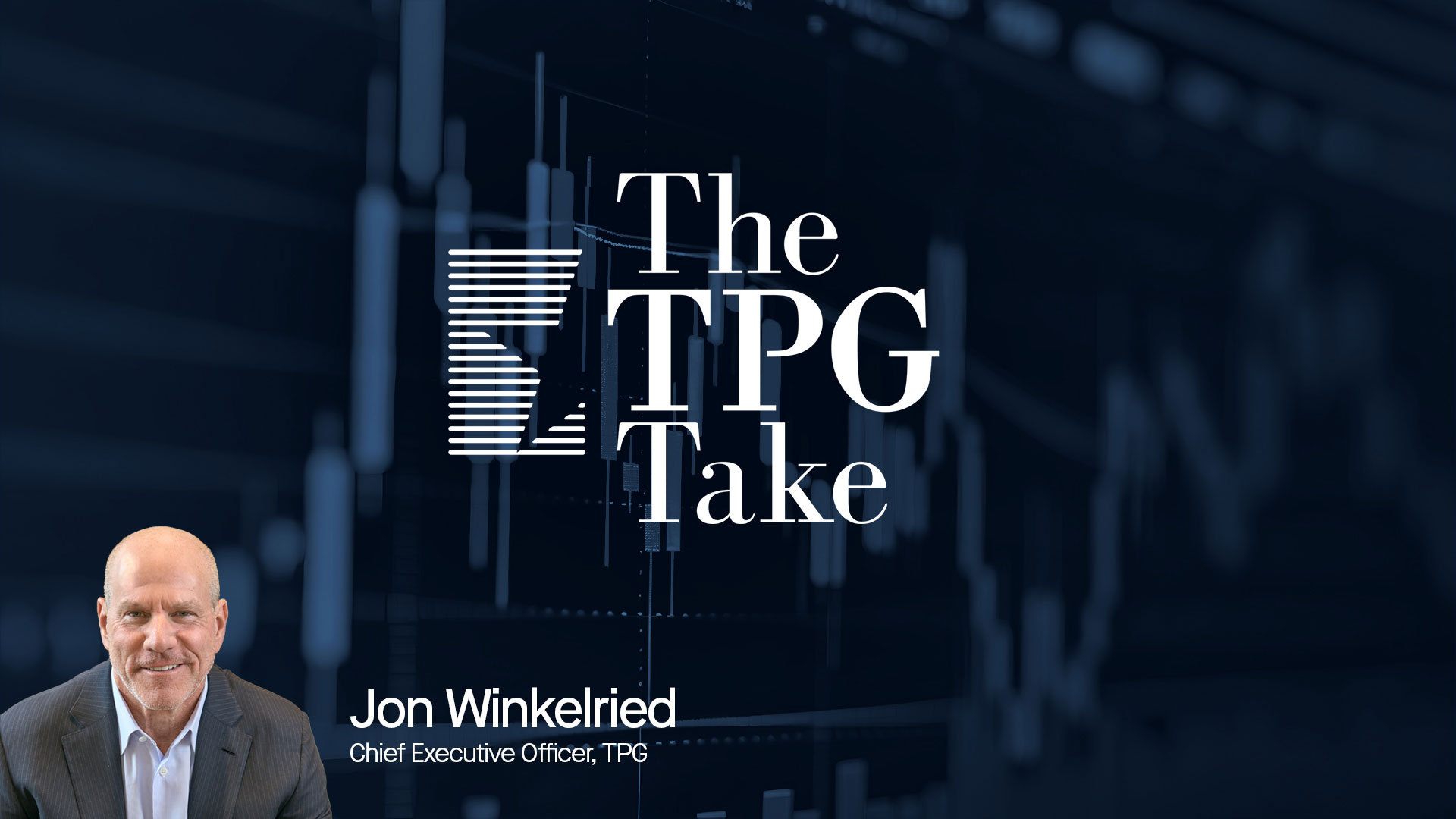
May 2025, Issue #11
Mid-Year Macro Perspectives From CEO Jon Winkelried
In our latest issue of The TPG Take, we sit down with CEO Jon Winkelried who shares his perspective on navigating the current macroeconomic landscape, from evolving market correlations to leadership in times of uncertainty.
He also discusses the critical role of private capital in driving growth and resilience, and how we're positioning the firm to stay focused and find opportunities in this environment.
Market Correlations During Times of Uncertainty
Jon Winkelried: "If you look at how the market is reacting based upon what policy is now, you're seeing some very unusual correlations. And correlations in markets usually tell you something.
In the current situation, you have some underlying concern about potential recession, or slow down in the economy, and normally what you would see is interest rates going down. But what we're actually seeing is a change in the structure of the yield curve and long-term rates going up. What that tells you is that the markets are concerned about the inflationary effects of what's happening, and concerned that people may be moving away from U.S.-based assets or dollar-based assets.
So, is that going to affect our ability to finance ourselves? It's not clear now what the Fed feels they need to do as a result of the potential inflationary factors of large tariffs, for instance. The other unusual correlation happening now is that if bond or treasury yields go up, it usually attracts capital to the dollar. That's not happening. The dollar has been under a lot of pressure, so we're generally seeing an emotional reaction in terms of consumer confidence."
What is the Role of Private Capital in the Global Economy?
Jon Winkelried: "We're seeing the banks taking a step back or being constrained in terms of the ability to provide capital, and private capital pools have stepped in. The last decade has been hugely transformative in terms of how capital is getting to the most interesting companies in the world, and how those companies are being owned and governed.
Firms like ours have been the beneficiaries of that tailwind in terms of capital coming in to be deployed into these private market opportunities. I don't see that changing – it ebbs and flows, but I only see it increasing in terms of the critical role that private capital will play in the provision of capital globally."
Positioning the Firm Amid Uncertainty
Jon Winkelried: "We always have a high level of engagement with our portfolio, both in terms of driving value creation, but also partnering with our CEOs, entrepreneur founders, and management teams. In times like these, that partnership is extremely valuable.
There are over a thousand companies in our ecosystem across our private equity, credit, and real estate businesses. And looking at that portfolio, what we think of as the first-order exposure to tariffs is fairly minimal based upon the sectors we focus on, the types of companies we invest in, and the themes that we feel benefit from secular growth. Now, the second- and third-order exposures – if we fall into recession, what happens with the consumer, etc. – are another question, which we haven't seen fully play out yet.
When you start to look at our credit or real estate businesses, you're also seeing something slightly different. Credit markets through this period have acted fairly rationally and are functioning pretty well. If you look at credit spreads – which is always a measure of how people perceive risk, particularly in the corporate sector – they've widened, which you would expect as a result of the potential recession. But when you look at the distribution of credit spreads over time, on average they are still fairly compressed. So does it look like we're heading into a distress cycle or a default cycle from a credit perspective? To us, right now it doesn't, and deals are still getting done. In other words, companies and deals are still getting financed, so things are behaving relatively rationally.
The other thing that's really important in times like this, is to stay focused on where the opportunities are being created, and you only see those if you are deeply embedded in these markets and industries. We have developed long-term relationships and mutual respect with our companies, CEOs, and management teams, such that our capital is solving a problem and, together, we can create a win-win situation."
Perspectives on Leadership
Jon Winkelried: "From a leadership perspective, when you go through these periods of tremendous uncertainty, it's a certainty that if you're feeling nervous or off, pretty much everybody in your organization is feeling the same way. The key is to remain calm and ensure touch points across your organization, and really reinforce the level of contact, communication, and transparency.
One of the things that I did on the credit side, I got together all of our portfolio managers with our head of risk, and had an open dialogue about what we're all seeing in different markets from the front lines. Doing things that may seem very simple, but are enhancing communication, I think, is a very important tool and discipline at times like this."
In Other News & Views...
As usual, we also want to "circle back" to share other recent insights from our ecosystem, senior leaders, and investing professionals that you might have missed.
TPG Angelo Gordon recently closed on nearly $2.3 billion for its Europe Real Estate strategy. Fund IV is the strategy’s largest to date, 50% ahead of its predecessor vehicle, a testament to our operating partner network, disciplined investment approach, and highly dedicated team. In this episode of Investment Insights, learn more about the business from Anuj Mittal, Partner and Head of TPG AG Europe Real Estate, and Tom Rowley, Partner and Co-Portfolio Manager of TPG AG Europe Real Estate.
In our series Partnerships in Focus, we hear directly from leaders across the TPG portfolio and ecosystem. In this episode, we hear from Dilip Jose, Managing Director and CEO of Manipal Hospitals – the largest hospital chain in India today. Dilip shares his perspective on what TPG’s experience, unique sector expertise, and ecosystem has brought to the partnership, and how TPG has helped enable the multi-specialty hospital’s continued growth in the region.
Thank you to all of our followers and readers for joining us for another edition of The TPG Take. Please share the newsletter with anyone you think would be interested and we look forward to being back in your inboxes.

TPG
345 California St suite 3300, San Francisco, CA 94104, USA
Important Disclosures
This material is solely for informational purposes and shall not constitute an offer to sell or the solicitation to buy securities. The opinions expressed herein represent the current, good faith personal views of the author(s) at the time of publication, and do not necessarily represent the views of TPG, its affiliates, or any of its investment professionals. The opinions expressed herein are not definitive investment advice and should not be relied on as such. The information presented herein has been developed internally and/or obtained from sources believed to be reliable; however, TPG does not guarantee the accuracy or completeness of such information. We provide links to third party websites only as a convenience and the inclusion of such links does not imply any endorsement, approval, investigation, verification or monitoring by us of any content or information contained within or accessible from the linked sites. If you choose to visit the linked sites you do so at your own risk, and you will be subject to such sites' terms of use and privacy policies, over which TPG has no control. In no event will TPG be responsible for any information or content within the linked sites or your use of the linked sites. Predictions, opinions, and other information contained in this material are subject to change continually and without notice of any kind and may no longer be true after the date indicated. Any forward-looking statements speak only as of the date they are made, and TPG assumes no duty to and does not undertake to update forward-looking statements. Forward-looking statements are subject to numerous assumptions, risks and uncertainties, which change over time. Actual results could differ materially from those anticipated in forward-looking statements.
